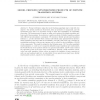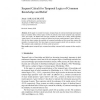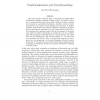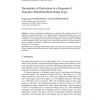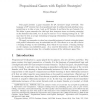120
click to vote
CORR
2007
Springer
15 years 2 months ago
2007
Springer
Formal verification using the model checking paradigm has to deal with two aspects: The system models are structured, often as products of components, and the specification logic...
115
Voted
INFORMATICALT
2006
15 years 2 months ago
2006
In this paper we consider two logics: temporal logic of common knowledge and temporal logic of common belief. These logics involve the discrete time linear temporal logic operators...
121
Voted
CORR
2007
Springer
15 years 2 months ago
2007
Springer
When a physicist performs a quantic measurement, new information about the system at hand is gathered. This presentation studies the logical properties of how this new information...
134
click to vote
JANCL
2008
15 years 2 months ago
2008
This paper employs epistemic logic to investigate the philosophical foundations of Bayesian updating in belief revision. By Bayesian updating, we understand the tenet that an agen...
114
Voted
IGPL
2006
15 years 2 months ago
2006
Very recently, a (fuzzy modal) logic to reason about coherent conditional probability, in the sense of de Finetti, has been introduced by the authors. Under this approach, a condi...
95
Voted
INFORMATICALT
2008
15 years 2 months ago
2008
A transitive distributed knowledge logic is considered. The considered logic S4nD is obtained from multi-modal logic S4n by adding transitive distributed knowledge operator. For a ...
121
Voted
IANDC
2006
15 years 2 months ago
2006
We propose a modular approach to defining notions of simulation, and modal logics which characterise them. We use coalgebras to model state-based systems, relators to define notio...
85
Voted
FUIN
2006
15 years 2 months ago
2006
Logics for expressing properties of Petri hypernets, a visual formalism for modelling mobile agents, are proposed. Two classes of properties are of interest--the temporal evolution...
152
Voted
ENTCS
2006
15 years 2 months ago
2006
This paper presents a game semantics for LP, Artemov's Logic of Proofs. The language of LP extends that of propositional logic by adding formula-labeling terms, permitting us...
139
Voted
ENTCS
2006
15 years 2 months ago
2006
This paper has the purpose of reviewing some of the established relationships between logic and concurrency, and of exploring new ones. Concurrent and distributed systems are noto...
